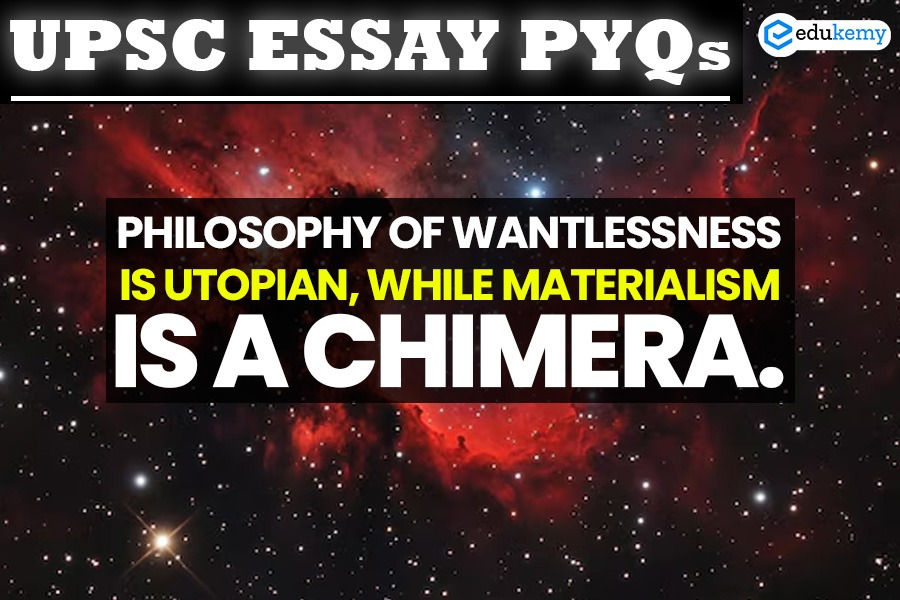Explore UPSC Essay PYQ 2021 on wantlessness vs materialism, analyzing ethics, culture, psychology, and societal impact of both philosophies.
Contents
Essay Key
| Component | Details |
|---|---|
| Essay Topic | Philosophy of wantlessness is Utopian, while materialism is a chimera |
| Paraphrase | This essay explores the opposing philosophies of wantlessness as an ideal state of contentment and materialism as a deceptive pursuit of happiness. |
| Intent of the Essay | To examine how the philosophies of wantlessness and materialism shape personal and societal values, with a focus on the ethical contrast between desire and contentment. |
| Keywords | Wantlessness, Materialism, Utopianism, Ethics, Contentment |
Key Arguments
1. The Utopian Ideal of Wantlessness
Wantlessness is often seen as a state of minimalism and detachment from material desires.
● It emphasizes finding contentment and fulfillment beyond material possessions.
● Evidence/Data: Thinkers like Gandhi promoted simplicity and non-attachment as key to true happiness.
2. Materialism as an Illusion
Materialism suggests that happiness lies in accumulating wealth and possessions.
● However, this idea is often criticized for creating dissatisfaction and unending desire.
● Evidence/Data: Studies reveal that beyond a certain point, more income does not significantly increase life satisfaction.
3. Ethical Dimensions of Both Approaches
Wantlessness supports ethical and sustainable living by reducing harm to people and the planet.
● In contrast, materialism can result in overconsumption and exploitation, raising moral concerns.
● Evidence/Data: Corporate ethics studies show how consumer choices can influence global inequality.
4. Insights from Psychology
Wantlessness aligns with mental well-being practices that focus on mindfulness and self-acceptance.
● Materialism, on the other hand, is often linked to anxiety, stress, and lower life satisfaction.
● Evidence/Data: Psychological research finds that materialistic values are associated with unhappiness and strained relationships.
5. Cultural Interpretations and Values
Cultures around the world differ in how they view and balance wantlessness and materialism.
● Eastern philosophies like Buddhism value wantlessness, while Western societies tend to celebrate material achievement.
● Evidence/Data: Cross-cultural studies show that cultural views on happiness vary based on these orientations.
Case Studies/Examples
| Case Study | Key Insights | Relevance |
|---|---|---|
| The Minimalist Movement | Emphasizes intentional living and prioritizing experiences over possessions. | Reflects the philosophy of wantlessness in modern society. |
| Consumerism Trends in the U.S. | Rising debt rates indicate the pitfalls of materialistic pursuits in a capitalist society. | Highlights the chimera of materialism and its societal costs. |
| Buddhist Practices in Tibet | Demonstrates how wantlessness fosters community bonding and spiritual growth. | Serves as an example of ethical and fulfilling living outside material desires. |

Additional Tips
- Incorporate discussions on the role of technology and advertising in perpetuating materialistic values.
- Explore how economic systems, such as capitalism, reinforce materialistic societies and examine potential alternatives.
- Engage with contemporary debates around sustainability and the environmental ethics of both philosophies.
- Use philosophical texts from prominent thinkers, like John Stuart Mill and Karl Marx, for deeper insights.

